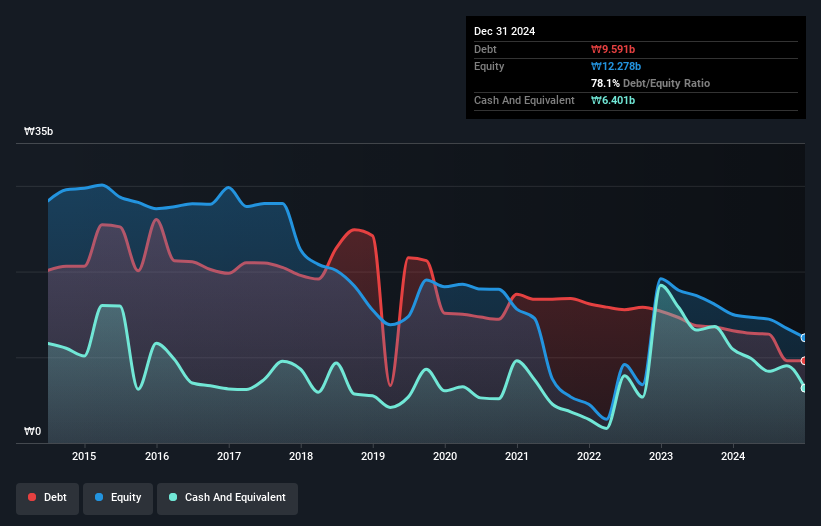David Iben put it well when he said, 'Volatility is not a risk we care about. What we care about is avoiding the permanent loss of capital.' So it might be obvious that you need to consider debt, when you think about how risky any given stock is, because too much debt can sink a company. We note that KOYJ Co., Ltd. (KOSDAQ:121850) does have debt on its balance sheet. But is this debt a concern to shareholders?
Our free stock report includes 4 warning signs investors should be aware of before investing in KOYJ. Read for free now.What Risk Does Debt Bring?
Generally speaking, debt only becomes a real problem when a company can't easily pay it off, either by raising capital or with its own cash flow. In the worst case scenario, a company can go bankrupt if it cannot pay its creditors. However, a more common (but still painful) scenario is that it has to raise new equity capital at a low price, thus permanently diluting shareholders. Having said that, the most common situation is where a company manages its debt reasonably well - and to its own advantage. When we examine debt levels, we first consider both cash and debt levels, together.
What Is KOYJ's Net Debt?
The image below, which you can click on for greater detail, shows that KOYJ had debt of ₩9.59b at the end of December 2024, a reduction from ₩13.1b over a year. However, it does have ₩6.40b in cash offsetting this, leading to net debt of about ₩3.19b.

A Look At KOYJ's Liabilities
The latest balance sheet data shows that KOYJ had liabilities of ₩14.5b due within a year, and liabilities of ₩2.00b falling due after that. Offsetting this, it had ₩6.40b in cash and ₩2.99b in receivables that were due within 12 months. So it has liabilities totalling ₩7.06b more than its cash and near-term receivables, combined.
Of course, KOYJ has a market capitalization of ₩35.5b, so these liabilities are probably manageable. But there are sufficient liabilities that we would certainly recommend shareholders continue to monitor the balance sheet, going forward. The balance sheet is clearly the area to focus on when you are analysing debt. But you can't view debt in total isolation; since KOYJ will need earnings to service that debt. So if you're keen to discover more about its earnings, it might be worth checking out this graph of its long term earnings trend.
Check out our latest analysis for KOYJ
Over 12 months, KOYJ reported revenue of ₩21b, which is a gain of 26%, although it did not report any earnings before interest and tax. Shareholders probably have their fingers crossed that it can grow its way to profits.
Caveat Emptor
Even though KOYJ managed to grow its top line quite deftly, the cold hard truth is that it is losing money on the EBIT line. Indeed, it lost ₩3.2b at the EBIT level. Considering that alongside the liabilities mentioned above does not give us much confidence that company should be using so much debt. Quite frankly we think the balance sheet is far from match-fit, although it could be improved with time. However, it doesn't help that it burned through ₩4.5b of cash over the last year. So suffice it to say we consider the stock very risky. When analysing debt levels, the balance sheet is the obvious place to start. However, not all investment risk resides within the balance sheet - far from it. Case in point: We've spotted 4 warning signs for KOYJ you should be aware of, and 3 of them are significant.
Of course, if you're the type of investor who prefers buying stocks without the burden of debt, then don't hesitate to discover our exclusive list of net cash growth stocks, today.
Valuation is complex, but we're here to simplify it.
Discover if KOYJ might be undervalued or overvalued with our detailed analysis, featuring fair value estimates, potential risks, dividends, insider trades, and its financial condition.
Access Free AnalysisHave feedback on this article? Concerned about the content? Get in touch with us directly. Alternatively, email editorial-team (at) simplywallst.com.
This article by Simply Wall St is general in nature. We provide commentary based on historical data and analyst forecasts only using an unbiased methodology and our articles are not intended to be financial advice. It does not constitute a recommendation to buy or sell any stock, and does not take account of your objectives, or your financial situation. We aim to bring you long-term focused analysis driven by fundamental data. Note that our analysis may not factor in the latest price-sensitive company announcements or qualitative material. Simply Wall St has no position in any stocks mentioned.
About KOSDAQ:A121850
KOYJ
Engages in the manufacture and sale of composite optical films and materials in South Korea.
Very low risk with worrying balance sheet.
Market Insights
Community Narratives




